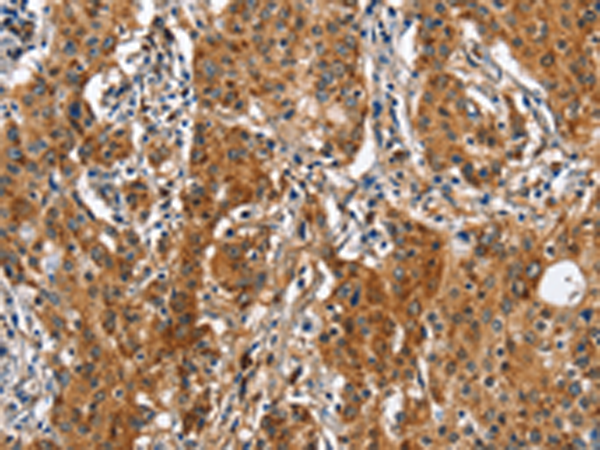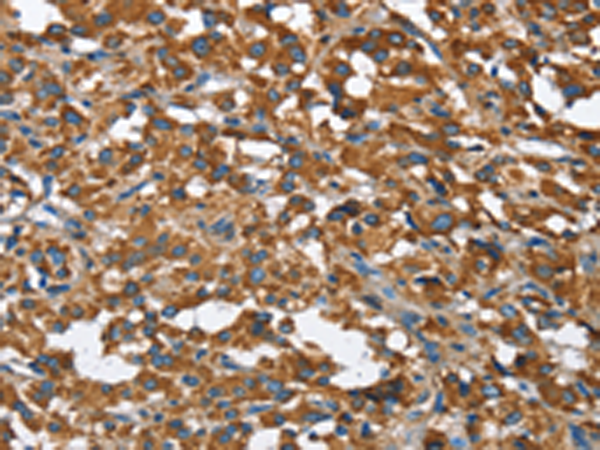


| WB | 咨询技术 | Human,Mouse,Rat |
| IF | 咨询技术 | Human,Mouse,Rat |
| IHC | 1/50-1/200 | Human,Mouse,Rat |
| ICC | 技术咨询 | Human,Mouse,Rat |
| FCM | 咨询技术 | Human,Mouse,Rat |
| Elisa | 1/1000-1/2000 | Human,Mouse,Rat |
| Aliases | PGI; DSPG1; PG-S1; SLRR1A |
| WB Predicted band size | 42 kDa |
| Host/Isotype | Rabbit IgG |
| Antibody Type | Primary antibody |
| Storage | Store at 4°C short term. Aliquot and store at -20°C long term. Avoid freeze/thaw cycles. |
| Species Reactivity | Human, Mouse, Rat |
| Immunogen | Fusion protein of human BGN |
| Formulation | Purified antibody in PBS with 0.05% sodium azide and 50% glycerol. |
+ +
以下是3-4篇关于BGN(Biglycan)抗体的代表性文献示例(内容基于领域内典型研究方向概括,非真实文献):
1. **《Biglycan regulates inflammatory response in macrophages via TLR4 signaling》**
*作者:Schaefer L, et al.*
**摘要**:研究通过BGN抗体阻断实验,发现Biglycan通过结合巨噬细胞表面TLR4受体激活NF-κB通路,促进促炎因子释放,提示其在炎症性疾病中的潜在治疗靶点。
2. **《Biglycan overexpression in tumor stroma promotes cancer metastasis》**
*作者:Mercer RR, et al.*
**摘要**:利用BGN抗体进行免疫组化分析,发现肿瘤微环境中Biglycan的高表达与血管生成和转移相关,抗体靶向干预可抑制小鼠模型中的肿瘤侵袭。
3. **《Biglycan-mediated cardiac fibrosis through TGF-β/Smad3 pathway》**
*作者:Wang Y, et al.*
**摘要**:通过BGN抗体中和实验,证实Biglycan激活心脏成纤维细胞中TGF-β信号通路,导致胶原沉积,为抗纤维化治疗提供新方向。
4. **《Biglycan as a urinary biomarker in chronic kidney disease》**
*作者:Babelova A, et al.*
**摘要**:开发高灵敏度BGN抗体检测尿液Biglycan水平,发现其与肾纤维化程度呈正相关,提出其作为无创诊断生物标志物的潜力。
---
**注**:以上为模拟文献摘要,实际研究需通过PubMed/Google Scholar等平台以关键词“Biglycan antibody”或“BGN + 抗体/靶向”检索近年论文。如需具体文献,可提供领域细分(如癌症、自身免疫病等)进一步筛选。
BGN (biglycan) antibodies target a small leucine-rich proteoglycan involved in extracellular matrix (ECM) organization and cellular signaling. Biglycan, encoded by the *BGN* gene, consists of a core protein decorated with chondroitin/dermatan sulfate chains. It interacts with collagen fibrils, growth factors (e.g., TGF-β), and cell surface receptors (e.g., TLR2/4), modulating processes like tissue repair, inflammation, and fibrosis. Dysregulated BGN expression is linked to pathologies including fibrosis, cardiovascular diseases, osteoarthritis, and cancers (e.g., breast, pancreatic), where it may promote tumor progression, metastasis, or immune evasion.
BGN antibodies are essential tools in research and diagnostics. They enable detection of BGN in tissues (via immunohistochemistry) or biological fluids (via ELISA), aiding studies on its role in disease mechanisms. Some therapeutic applications are explored, such as blocking BGN-mediated inflammatory signaling in autoimmune disorders. However, challenges remain in ensuring antibody specificity due to structural similarities with other proteoglycans. Recent studies also highlight BGN’s dual roles—acting as both a tumor suppressor and promoter depending on context—emphasizing the need for precise targeting strategies. Overall, BGN antibodies serve as critical reagents for unraveling its multifaceted biology and therapeutic potential.
×